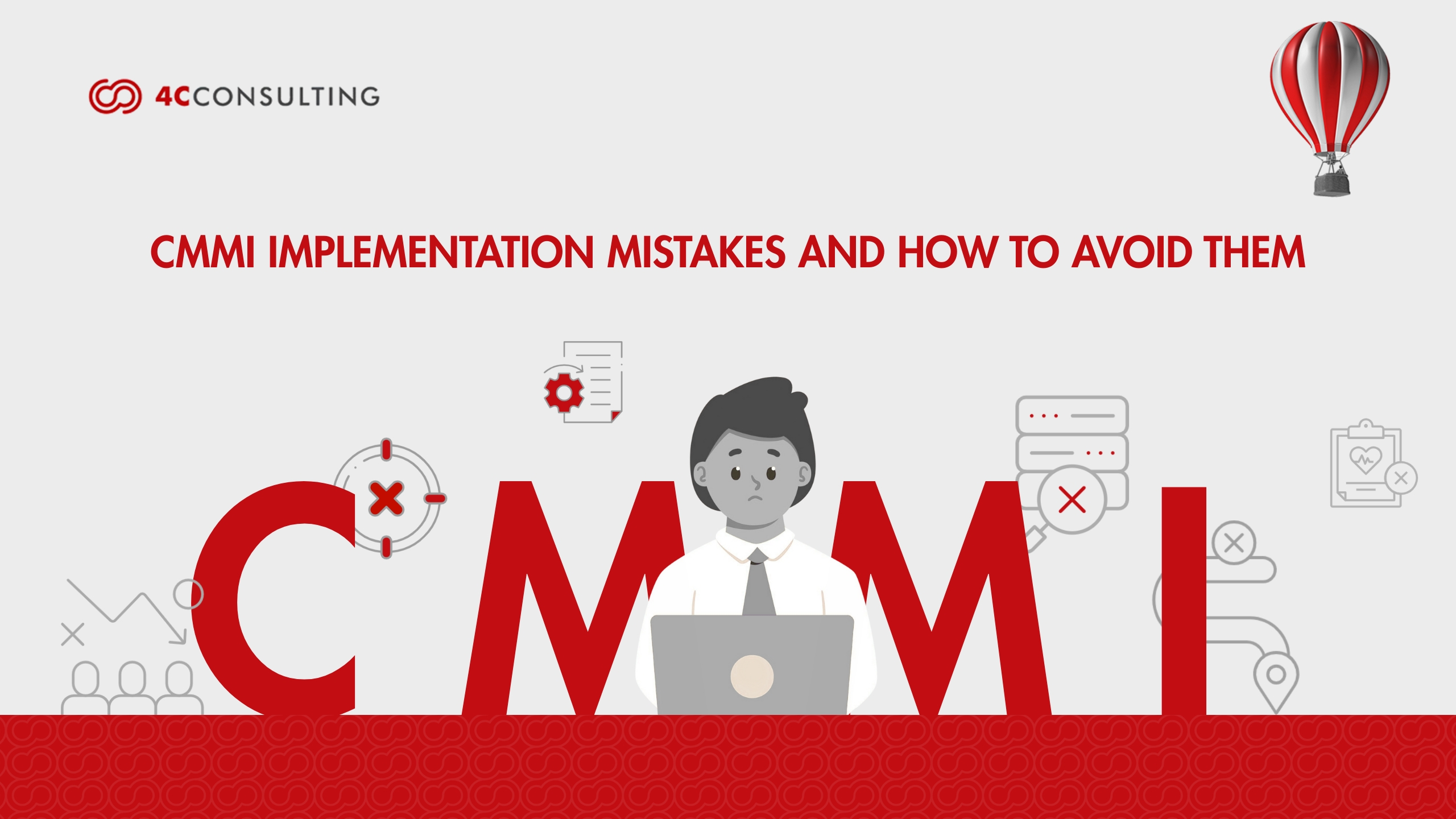
Table of Contents
- What Is CMMI?
- Key Aspect of CMMI
- Common Mistakes in CMMI Implementation (and How to Avoid Them)
- How 4C Consulting Can Help Your Organization Achieve Successful CMMI Implementation?
- FAQs
- Is CMMI a certification or a framework?
- What are the main objectives of CMMI?
- What are the key steps in CMMI implementation?
- What is included in a CMMI appraisal?
- How long does CMMI certification remain valid?
- What is the purpose of a CMMI implementation roadmap?
- Is CMMI suitable for non-IT organizations?
- How can an organization achieve higher CMMI maturity levels?
- Why is continuous improvement important in CMMI implementation?
- What is a CMMI maturity level?
- What skills are needed for effective CMMI implementation?
CMMI Implementation Mistakes and How to Avoid Them
14th Nov, 2025
Over 60 % of organizations fail to achieve their targeted CMMI maturity level because of fragmented planning, weak leadership engagement, or inconsistent process execution. These breakdowns cause rework, extended CMMI appraisal cycles and loss of operational efficiency. When frameworks become documentation-driven rather than improvement-driven, the outcome is predictable project slippages, quality decline and loss of customer trust.
Achieving sustained performance requires a structured model that transforms scattered practices into disciplined, measurable and continuously improving processes. Capability Maturity Model Integration (CMMI) provides this structure, enabling organizations to strengthen quality, manage risk and build scalable maturity across projects and functions.
In this blog, we address the most common CMMI implementation mistakes and outline practical strategies to avoid them helping your organization move confidently toward higher maturity levels and measurable business outcomes
What Is CMMI?
CMMI (Capability Maturity Model Integration) is a globally recognized framework that enables organizations to improve processes, enhance quality and achieve predictable performance. It provides a structured set of best practices to guide process improvement across projects, departments, or the entire organization. CMMI defines five maturity levels representing the journey from reactive to optimized operations:
- Level 1 Initial: Processes are unpredictable and reactive.
- Level 2 Managed: Projects are planned and executed as per policy.
- Level 3 Defined: Processes are standardized and integrated organization-wide.
- Level 4 Quantitatively Managed: Data and metrics drive decisions.
- Level 5 Optimizing: Continuous process improvement and innovation prevail.
Key Aspect of CMMI
- Process Improvement: CMMI establishes a structured path to close gaps and enhance quality across projects while aligning improvements with business goals.
- Performance Predictability: Standardized metrics deliver consistent outcomes in quality, cost and customer satisfaction.
- Risk Management: Built-in risk identification and mitigation reduce rework and strengthen resilience.
- Scalability: CMMI scales across teams and functions for both SMEs and enterprises undergoing CMMI implementation India.
- Continuous Improvement: At higher maturity levels, CMMI creates a culture of innovation and learning that turns compliance into excellence.
Common Mistakes in CMMI Implementation (and How to Avoid Them)
- Unclear Maturity Roadmap: One of the most frequent CMMI implementation mistakes organizations make is starting without a clear roadmap that connects business goals with process maturity levels. Teams often rush toward achieving CMMI Level 3 certification without assessing their current capabilities, resulting in fragmented adoption and unclear ownership.
Solution: Without a roadmap, improvement initiatives lose direction and consistency. Develop a phased CMMI implementation roadmap supported by professional CMMI consulting services that defines maturity stages, timelines and milestones. A structured roadmap aligns leadership vision with operational practices, ensures measurable progress and provides a reliable guide toward higher CMMI maturity levels. - Paper-Driven, Not Practice-Led: Many organizations in CMMI implementation India treat the framework as a documentation exercise rather than a performance enabler. They produce policies, manuals and templates that fulfil audit checklists but fail to impact real project outcomes. This “paper maturity” gives the illusion of compliance but doesn’t strengthen delivery excellence or stakeholder confidence.
Solution: Shift the focus from documentation to adoption. Work with a seasoned CMMI consultant to embed model practices into daily project workflows. A practice-led approach supported by expert CMMI consulting ensures that defined processes deliver measurable performance improvements instead of remaining theoretical. - No Baseline or Gap Check: A successful CMMI implementation begins with understanding where your organization currently stands. Many companies skip baseline or gap analysis, leading to duplicated processes, misplaced priorities and delayed CMMI appraisals. Without this foundation, implementation becomes reactive rather than strategic. Conduct a structured baseline and gap assessment guided by experienced CMMI consultants. This diagnostic identifies existing capabilities, risks and improvement priorities, helping organizations build an evidence-based CMMI implementation roadmap that accelerates maturity and prevents redundant effort.
- Low Workforce Involvement: A frequent CMMI implementation challenge is low employee engagement. When top management drives the process in isolation, employees view CMMI as an administrative burden rather than a professional growth tool. This lack of involvement weakens process ownership and results in inconsistent execution. such as, encourage organization-wide participation through awareness sessions, role-based training and pilot projects designed by skilled CMMI Level 3 certification consultants. Active employee engagement turns compliance into collaboration, ensuring that process improvements are adopted, practiced and sustained across functions.
- Missing Data Validation: CMMI emphasizes data-driven decision-making, but many organizations fail to validate their metrics effectively. Inaccurate or incomplete data compromises analysis, weakens management reviews and misguides strategic decisions. Over time, this erodes confidence in the system’s reliability. Build a robust data governance mechanism under expert CMMI consulting services. Establish metric definitions, validation checkpoints and review cycles to ensure data accuracy and consistency. As outlined in this CMMI guide, validated data becomes the foundation for quantitative management and continuous improvement.
- Process Copy, No Custom Fit: Copying templates from other companies or online sources is one of the most counterproductive CMMI implementation mistakes. Generic processes rarely align with a company’s size, culture, or delivery model. Such systems create confusion, reduce efficiency and fail to add real business value.
Solution: Customize each process area with the support of a qualified CMMI consultant. Tailoring the model to your business context ensures alignment with project realities, team dynamics and organizational culture—turning CMMI into a growth enabler rather than a paperwork burden. - No Internal Health Check: Organizations often wait for external appraisals to assess maturity, ignoring internal readiness checks. Without periodic internal audits or reviews, non-conformities accumulate and certification timelines stretch. This reactive approach weakens confidence during SCAMPI or benchmark evaluations.
Schedule structured internal assessments and health checks at every stage of CMMI implementation. Engage your CMMI consulting partner to conduct mock appraisals, ensuring early detection of deviations and sustained system performance between formal evaluations. - Disconnected from Business Goals: CMMI efforts fail when process maturity operates separately from business objectives. If implementation focuses solely on certification, organizations miss the opportunity to improve delivery efficiency, reduce defects and strengthen profitability. CMMI must be a business strategy, not just a compliance exercise. Integrate CMMI implementation steps with corporate KPIs using experienced CMMI consulting expertise. Align process performance with metrics such as on-time delivery, client satisfaction and cost optimization so that maturity contributes directly to organizational growth.
- No Culture of Continuous Improvement: Many organizations lose momentum after achieving certification, treating it as the end rather than the beginning of continuous evolution. Without innovation and feedback loops, process performance stagnates and teams gradually revert to old habits. Build a continuous improvement ecosystem with guidance from trusted CMMI consulting services in India. Encourage cross-functional reviews, performance dashboards and leadership-driven improvement projects. A culture of ongoing enhancement ensures that your CMMI maturity levels remain sustainable and future-ready.
A strong CMMI implementation is about building capability, not just compliance. By addressing key CMMI implementation challenges early and following a structured CMMI implementation roadmap, organizations can improve delivery quality and business resilience. With guidance from expert CMMI consultants and trusted CMMI consulting services in India, achieving higher CMMI maturity levels becomes a measurable and sustainable journey toward continuous improvement and excellence.
How 4C Consulting Can Help Your Organization Achieve Successful CMMI Implementation?
With over 15+ years of process excellence expertise and 10,000+ consulting hours, 4C Consulting enables organizations to implement CMMI frameworks efficiently and avoid common maturity-level pitfalls. Our certified consultants provide end-to-end support from gap assessment, process design, and documentation to training, internal appraisals and SCAMPI readiness. Using a proven, practical approach, we help businesses streamline workflows, reduce rework and align process maturity with strategic goals. Book your 1-Hour Free CMMI Consultation today and start building a performance driven, audit-ready organization.
Also Read – What are the Certifications for IT/ITES Organisations? What are their benefits?
FAQs
Is CMMI a certification or a framework?
CMMI is a framework, not a certification. It provides structured best practices for improving organizational processes. Organizations are appraised at specific maturity levels based on their implementation and compliance.
What are the main objectives of CMMI?
The key objectives of CMMI are to enhance process capability, reduce risks, improve delivery performance and foster continuous improvement. It helps organizations build a consistent, measurable and scalable performance model.
What are the key steps in CMMI implementation?
The main steps include gap analysis, process design, documentation, pilot runs, training, internal appraisals and formal evaluation. Following a structured CMMI implementation roadmap ensures alignment between process maturity and business goals.
What is included in a CMMI appraisal?
A CMMI appraisal evaluates an organization’s adherence to CMMI practices, documentation and performance outcomes. It involves evidence collection, interviews and process verification conducted by certified lead appraisers.
How long does CMMI certification remain valid?
A CMMI appraisal result remains valid for three years, provided the organization maintains its process maturity through periodic internal assessments and continuous improvement initiatives.
What is the purpose of a CMMI implementation roadmap?
A CMMI implementation roadmap serves as a structured plan that defines stages, milestones and responsibilities. It ensures clarity, alignment and measurable progress toward achieving desired maturity levels.
Is CMMI suitable for non-IT organizations?
While CMMI originated in software development, it is now widely applied in manufacturing, engineering, healthcare and service organizations to enhance quality, consistency and operational control.
How can an organization achieve higher CMMI maturity levels?
Organizations can achieve higher CMMI maturity levels by adopting a structured improvement approach under expert CMMI consulting services. Partnering with experienced CMMI consultants helps design tailored processes, conduct readiness appraisals and maintain continuous improvement. At 4C Consulting, our certified CMMI Level 3 certification consultants provide end-to-end CMMI implementation in India, from roadmap creation to final appraisal, guided by a proven CMMI guide that ensures measurable and sustainable results.
Why is continuous improvement important in CMMI implementation?
Continuous improvement sustains process maturity by identifying new optimization opportunities. It enables organizations to stay competitive, reduce inefficiencies and align operations with evolving business and customer needs.
What is a CMMI maturity level?
A CMMI maturity level indicates the organization’s process maturity and capability. Higher levels demonstrate greater standardization, data-driven decision-making and an established culture of continuous improvement.
What skills are needed for effective CMMI implementation?
Effective implementation requires project management, process analysis, risk assessment, data validation and quality assurance skills, along with strong leadership commitment and cross-functional collaboration.

